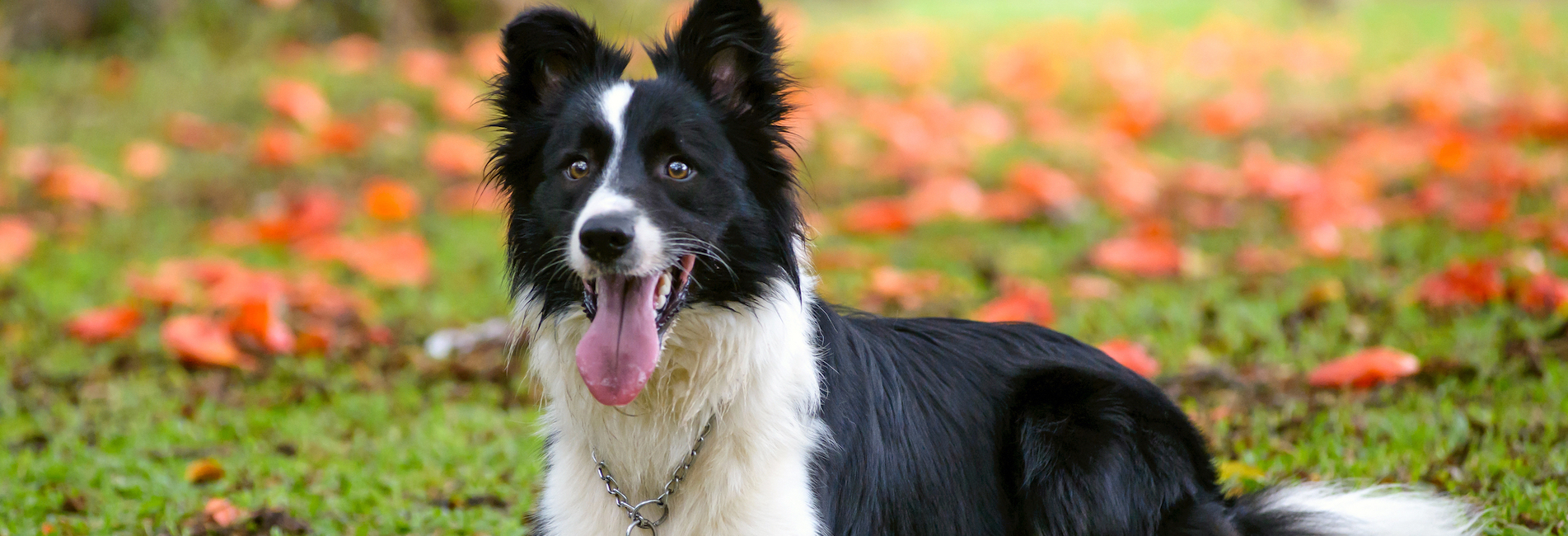Border Collies have a strong defined body, with bright intelligent eyes, and are perfectly suited to outdoors life. They have thick, long coats useful in all weathers and are instantly recognisable for their colour, which is usually black and white markings. They may enjoy getting dirty, but their coats do not need hours of attention from you.
History of the Border Collie
Border Collies are a traditional herding dog. Their origin is placed in the border counties between Scotland and England, but they have been found herding sheep across mainland Britain. Over time, there has been more than one Collie prefix, with Welsh Collies and Scottish Collies. The Border Collie we know today is said to have descended from a dog bred in Northumberland at the beginning of the 19th Century, hence the name Border Collie. It is only more recently that the Border Collie has been considered as a household pet, as opposed to the extremely popular herding dogs they had been for many years.
Quick Facts About Border Collies
Group: Herding.
Size: Medium.
Height: 46-56cm.
Weight: 12-20kg.
Average Lifespan: 10-17 years.
Moulting Level: Moderate.
Grooming: Weekly brushing.
Exercise Required: A minimum of two one-hour walks per day.
Temperament: Intelligent, high-energy, active.
General: Border Collies get along with children, the elderly and people with disabilities, and can live happily with other pets.
Getting your Dog
Tips on Getting a Border Collie
Make sure you do plenty of research before getting a Border Collie. Owning one will take a lot of time and commitment and you will need to ensure you can provide them with all the exercise and mental stimulation they need to stay happy and healthy. You can look to find a Border Collie at one of the many rescue centres across the country, with some breed-specific rescue centres which specialise in Border Collies. Alternatively, you can purchase from a breeder, who should let you know they have been well-socialised and have had all the necessary screening tests, health checks and vaccinations.
Are Border Collies good pets?
In a Border Collie you will find both obedience and understanding. They will always be ready to embark on an adventure and love to be involved in tasks, exercise and hard work. When trained, the Border Collie will be great with children and other pets, making them good family dogs. Their energy levels are high though, meaning they can become mischievous and disruptive if they feel bored, stressed or unstimulated.
As a herding dog, the Border Collie has a strong mind. They are keen to chase things and will need to be controlled in this regard when outside. They are fairly easy to train though, and a few simple training exercises at home should lead to some very good results when out and about.
Do they need much exercise?
As a natural herder, the Border Collie will thrive in large open spaces, and having the ability to run around in them. They will enjoy a long walk and are best suited to being in a rural setting. They will be drawn to herd just about anything that moves, so will need to adapt to this and be sure they are safe around things like cars. If you do not live in a rural area and are looking at the Border Collie as a breed for you, find a nice big field close to you and look at playing lots of fetch with them. Their energy levels are high and you will be looking at a minimum of two sizeable walks per day.
Feeding Your Border Collie
A Border Collies diet will vary depending on their age. You will need to feed them a complete, balanced dog food to keep them slim and healthy. Your vet will be able to best advise you on how much your Border Collie should be eating. You should look to feed them a good quality, complete dog food. It is advisable to feed your dog at the same time every day to get them into a routine, and you should leave a gap after eating and before exercising.
Grooming
A Border Collies coat does not require hours of grooming. You will only need to give them a thorough brush each week, and only the occasional bath. The Border Collie has either rough or smooth coats and although usually black and white, do come in a variety of colours.
- Baths and showers tend to be the best place to bathe your Border Collie. Put a mat down to stop them from slipping over.
- Border Collies can be sensitive to shampoos with a lot of chemicals or scents. Ensure you use a gentle shampoo with simple ingredients to avoid this.
- Use a face cloth or hand towel to gently wash your Border Collies face.
- Have a grooming brush or mitt to help remove any excess hair from your Border Collie.
- Clip the nails with a nail clipper, or alternatively use a Dremel intended for dogs, to keep the nails at a short length.
- If you get back from a muddy walk, or your Border Collie has just had a run in the garden following some rainfall, have a towel to hand to wipe the feet.
Health
Border Collies, like so many other purebred dogs, are at risk from certain problems and conditions relating to their breed.
- Hip dysplasia
- Collie eye anomaly
- Epilepsy
- Sensory neuropathy
Ownership costs
The likely lifetime cost for a Border Collie will need to be considered, and will typically include the following.
The list above does not include veterinary costs if your pet becomes sick or injured, so these average lifetime costs could be even higher.
Do they bark a lot?
Like with most dogs, a Border Collie will make some noise. You will find some are quite vocal, whilst others can be relatively quiet - it will just come down to the individual differences between Border Collies. Ensuring they have enough exercise and mental stimulation to keep them occupied may help to calm them down.
Can they be left alone?
Like most dogs, Border Collies can be prone to separation anxiety which can manifest itself in a number of ways; from vocalisations (howling and/or barking) as soon as you leave the room, to destructive behaviour, or even toileting. Thankfully with training, most dogs can overcome separation anxiety and be trained to be left alone (more information on treating seperation anxiety in dogs can be found here).
As a general rule Border Collies should not be left alone, and ideally need to be in a home where someone is around all the time to keep them active and make sure they don’t get bored. Alternatives such as boarding or hiring a dog walker should be considered if that isn’t possible for your situation.
In recent years the number of Doggy Daycare providers have expanded rapidly. Whilst this can be relatively expensive, it does have the advantage of both socialising your dog with the other dogs there, and as well as providing peace of mind that your dog is being supervised for the entire day. However, if Doggy Daycare is out of your price range there are other options, such as using a dog walking service. Services such as Rover or Wag! offer skilled walkers at affordable prices. This option is appropriate when you know you’ll be gone longer than four hours. In turn, your dog will have a chance to go to the bathroom and exercise while you’re away.
Investing in a mentally stimulating toy is a great way to keep your Border Collie separation anxiety at bay. Toys such as the ‘kong’ stuffed with food, are excellent at distracting your dog for the first 20-30 minutes when you leave.




